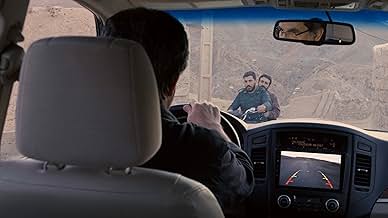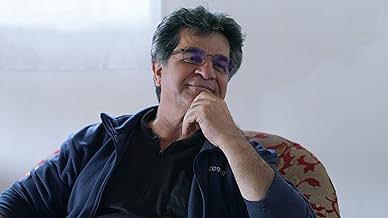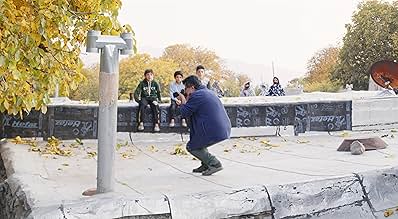AVALIAÇÃO DA IMDb
7,2/10
4,7 mil
SUA AVALIAÇÃO
Um retrato de duas histórias de amor contadas em paralelo. Em ambas, os amantes são afetados por obstáculos ocultos e inevitáveis, pela força da superstição local e pelos mecanismos do poder... Ler tudoUm retrato de duas histórias de amor contadas em paralelo. Em ambas, os amantes são afetados por obstáculos ocultos e inevitáveis, pela força da superstição local e pelos mecanismos do poder.Um retrato de duas histórias de amor contadas em paralelo. Em ambas, os amantes são afetados por obstáculos ocultos e inevitáveis, pela força da superstição local e pelos mecanismos do poder.
- Prêmios
- 4 vitórias e 8 indicações no total
Bakhtiyar Panjeei
- Bakhtiar
- (as Bakhtiar Panjei)
Narges Delaram
- Ghanbar's mother (Madar_e Ghanbar)
- (as Narjes Delaram)
Reza Heidari
- Reza
- (as Reza Heydari)
Aliye Tuzun
- Police
- (as Aliye Tüzün)
Avaliações em destaque
The movie "No Bears" has a sensitive and dramatic plot against the backdrop of political, religious, tradition, and cultural repression in the current Iranian world. There are two love stories told in parallel by the excellent director Jafar Panahi, who himself suffers military repression for his political movies that challenge the dictatorial Iranian government. Jafar Panahi manages to capture and transmit all the tension that Iranians suffer under the eyes of the so-called Cultural Police. We sense the pressure in the air and nobody wants to compromise or get involved or close to citizens considered traitors to the country and to the traditional customs.
Like many other incredible Iranian movies, "No Bears" is second to none in terms of quality. Simple in showing the daily life of a village and the background of filming a movie, but also bold in showing us what it's like to live in a repressive regime and not bend.
Like many other incredible Iranian movies, "No Bears" is second to none in terms of quality. Simple in showing the daily life of a village and the background of filming a movie, but also bold in showing us what it's like to live in a repressive regime and not bend.
No Bears is a metafictional exploration by Jafar Panahi, tackling the social and political restraints placed on himself and others. While the subject matter might seem daunting, the film is surprisingly accessible. Despite its gravity, it maintains a humble, understated tone, grounded by Panahi's calm demeanour, honesty, and politeness. Moments of dark-tinged humour-like Panahi reviewing footage accidentally left running on a camera-lighten the tension.
Panahi stars as himself, directing a film about two people attempting to migrate illegally, which is presented as a semi-documentary. In a unique twist, No Bears becomes a semi-documentary within a semi-documentary, blurring the boundaries of fiction and reality. Panahi has relocated to a small village near the Turkish border to direct remotely via webcam, as he was subject to a chronic travel ban at the time. Perhaps he sought proximity to his crew or a respite from the surveillance of Tehran. However, his interactions with the local villagers and the tensions of living near the border create a layered narrative that reflects both the film's themes and Panahi's real-life challenges. The frequent disruptions to his work caused by poor internet signal serve as a fitting metaphor for the control and limitations imposed on his creative freedom.
At its core, No Bears is a film about resistance. Panahi refuses to bow to Iranian authorities' attempts to silence him. His dealings with the villagers mirror his experiences with the regime-both characterised by arbitrary rules, superstitions, and traditions that he quietly defies. Acting as a beacon of reason, Panahi invites viewers to question the power of authoritarian systems, suggesting that their strength lies in collective compliance. The title, No Bears, reflects this theme. Villagers keep the young indoors with tales of bears prowling at night, but no such bears exist-a lie that encapsulates the broader dangers of imagined fears used as tools of control.
Panahi's calm rationality contrasts with the fabrications and self-deceptions around him. He resists not only the idea of leaving Iran to escape its constraints but also the notion that he should be forced to abandon his homeland to live freely. Why should he, or anyone, have to leave to live authentically?
Beneath Panahi's serene exterior lies a quiet yet profound frustration-his inability to fully integrate, to prevent tragedy, or to appeal to others' sense of reason. He is like Lemuel Gulliver, bound by the Lilliputians, constrained by a system of small yet unyielding forces.
Panahi stars as himself, directing a film about two people attempting to migrate illegally, which is presented as a semi-documentary. In a unique twist, No Bears becomes a semi-documentary within a semi-documentary, blurring the boundaries of fiction and reality. Panahi has relocated to a small village near the Turkish border to direct remotely via webcam, as he was subject to a chronic travel ban at the time. Perhaps he sought proximity to his crew or a respite from the surveillance of Tehran. However, his interactions with the local villagers and the tensions of living near the border create a layered narrative that reflects both the film's themes and Panahi's real-life challenges. The frequent disruptions to his work caused by poor internet signal serve as a fitting metaphor for the control and limitations imposed on his creative freedom.
At its core, No Bears is a film about resistance. Panahi refuses to bow to Iranian authorities' attempts to silence him. His dealings with the villagers mirror his experiences with the regime-both characterised by arbitrary rules, superstitions, and traditions that he quietly defies. Acting as a beacon of reason, Panahi invites viewers to question the power of authoritarian systems, suggesting that their strength lies in collective compliance. The title, No Bears, reflects this theme. Villagers keep the young indoors with tales of bears prowling at night, but no such bears exist-a lie that encapsulates the broader dangers of imagined fears used as tools of control.
Panahi's calm rationality contrasts with the fabrications and self-deceptions around him. He resists not only the idea of leaving Iran to escape its constraints but also the notion that he should be forced to abandon his homeland to live freely. Why should he, or anyone, have to leave to live authentically?
Beneath Panahi's serene exterior lies a quiet yet profound frustration-his inability to fully integrate, to prevent tragedy, or to appeal to others' sense of reason. He is like Lemuel Gulliver, bound by the Lilliputians, constrained by a system of small yet unyielding forces.
The way Jafar Panahi successfully transcends and exceeds all the limits in his filmmaking always leaves me mind-boggled and is fascinatingly masterful. This viewing experience left me with a question "To what extent are you willing to go to tell your story?"
No Bears takes us through a powerful journey of sophisticated simplicity that expands boundaries and defies censorship restrictions both mentally and physically and in a blend of fiction and realism with a story of adaptive determination in creating, fear of crucial decisions, and passion for the story.
His ability to shape the narrative with all these elements is beyond impressive as Panahi sheds his lens on a parallel story between reality and fiction under the premise of hope, while metaphorically introducing a bigger political theme of the fear of modern authority versus the absurdity of the superstition that remains a common element in both narratives including the self-reflexively portrayal of himself as a character, which also introduces an intimate layer.
The storytelling crafts beautifully palpable emotions some of which are felt indirectly, where the sense of fear and threat are always visible and kept translating different feelings so well through an observative lens.
No Bears takes us through a powerful journey of sophisticated simplicity that expands boundaries and defies censorship restrictions both mentally and physically and in a blend of fiction and realism with a story of adaptive determination in creating, fear of crucial decisions, and passion for the story.
His ability to shape the narrative with all these elements is beyond impressive as Panahi sheds his lens on a parallel story between reality and fiction under the premise of hope, while metaphorically introducing a bigger political theme of the fear of modern authority versus the absurdity of the superstition that remains a common element in both narratives including the self-reflexively portrayal of himself as a character, which also introduces an intimate layer.
The storytelling crafts beautifully palpable emotions some of which are felt indirectly, where the sense of fear and threat are always visible and kept translating different feelings so well through an observative lens.
A most excellent movie ! Thoroughly enjoyed it. For sure there were many layers and implicit meanings I missed but that is also what made this film so intriguing. The contrast between the mountain town in Iran and the city in Turkey, all the details, the character extras that clearly showed the cultural differences, I loved that. The border, the trafficking that was implied, the faithfulness to truth of the central actor who is also the director. It's also a movie that celebrates movie making, how storytelling prevails in film, the impact of a story upon the storyteller. It´s a very poignant movie.
Wonderful footage in a documentary style, great story, amazing insight into life on the frontier.
Well worth seeing.
Wonderful footage in a documentary style, great story, amazing insight into life on the frontier.
Well worth seeing.
Film director Jafar Panahi is prohibited from leaving Iran, but is trying to make a film in neighbouring Turkey. In order to make that work, he moves to a remote village near the border, where the communications are a bit hit and miss. With the help of his obliging host "Ghanbar" (Vahid Mobaseri), though, he tries to make the best of it. Initially, it's a friendly village but when he takes (or doesn't!) a photograph of a young couple, he finds himself drawn into an increasingly acrid stand-off between two young men, and their families, to whom a girl may have been betrothed when her umbilical cord was cut. His frustrations with these encroachments are not helped by production difficulties with the two two stars of his documentary-style film - real life lovers who are trying to find a way to escape, safely, to Paris. There is the slightest hint of menace here as the plot develops and although we see little actual evidence, there is a distinct sense that this man is increasingly unwelcome, despite the platitudes from the villagers, encouraging a sixth-sense feeling that the authorities are distantly watching this film-maker. There is a distinct perception of intimidation! What is also clear is that these ordinary Iranian people live in fear of the police, the Revolutionary guard and that rather flies in the face of their genuine, peaceable and hospitable, nature. Now, perhaps Panahi's less-is-more style works for some, but for me I found this all rather a slow watch. He shuffles around with little useful dialogue to develop his on-screen persona, nor my interest in him. Clearly this is a story about freedom and a sort of subliminal oppression but somehow the characters themselves here didn't really develop that theme sufficiently, nor did they really engage me. The ending, too, is disappointing and inconclusive in equal measure and I was rather underwhelmed. The film does offer us an interesting depiction of rural life that probably hasn't changed in millennia, but somehow I felt little better than a fly on the wall with nowhere near enough to go on to join in. Perhaps just too much of this is predicated on a knowledge by the audience of this director and of his relationship with his government.
Você sabia?
- CuriosidadesActually, the entire scene shot in Istanbul Kadikoy, not in Turkish border town.
Principais escolhas
Faça login para avaliar e ver a lista de recomendações personalizadas
- How long is No Bears?Fornecido pela Alexa
Detalhes
Bilheteria
- Faturamento bruto nos EUA e Canadá
- US$ 167.333
- Fim de semana de estreia nos EUA e Canadá
- US$ 6.173
- 25 de dez. de 2022
- Faturamento bruto mundial
- US$ 1.196.288
- Tempo de duração1 hora 46 minutos
- Cor
- Proporção
- 1.85 : 1
Contribua para esta página
Sugerir uma alteração ou adicionar conteúdo ausente























